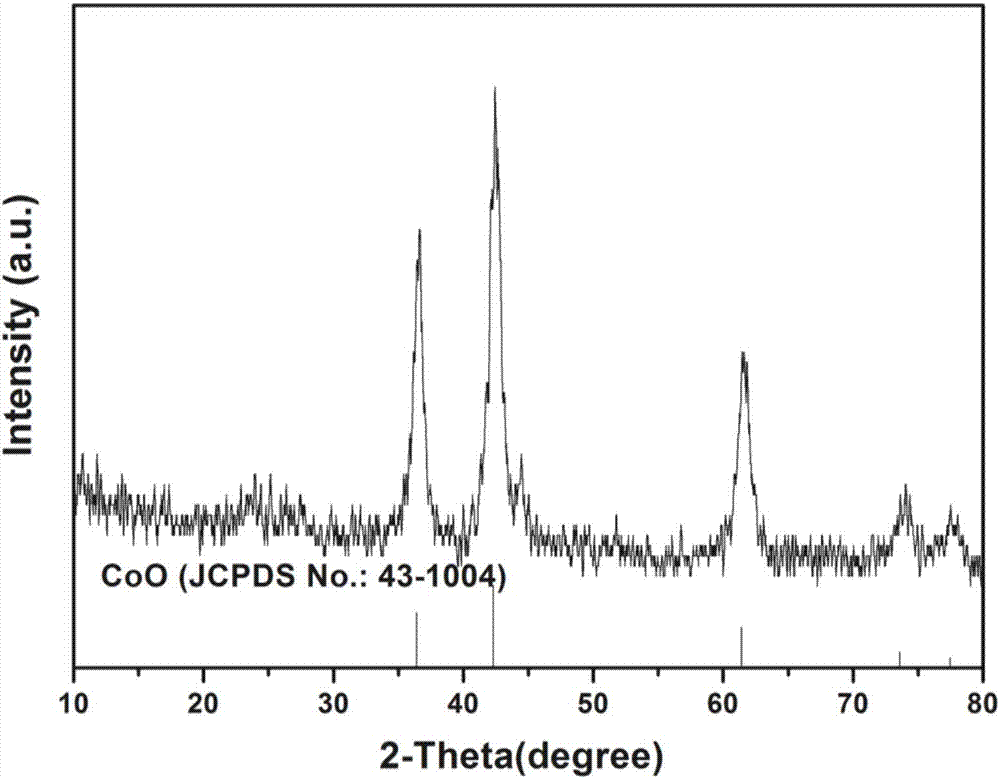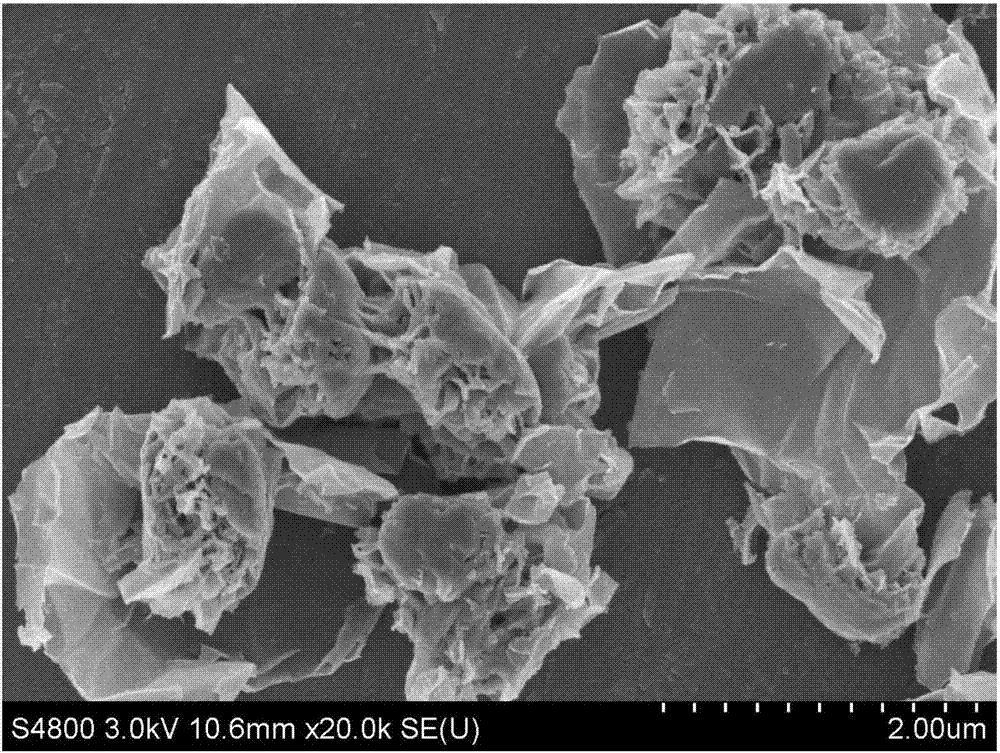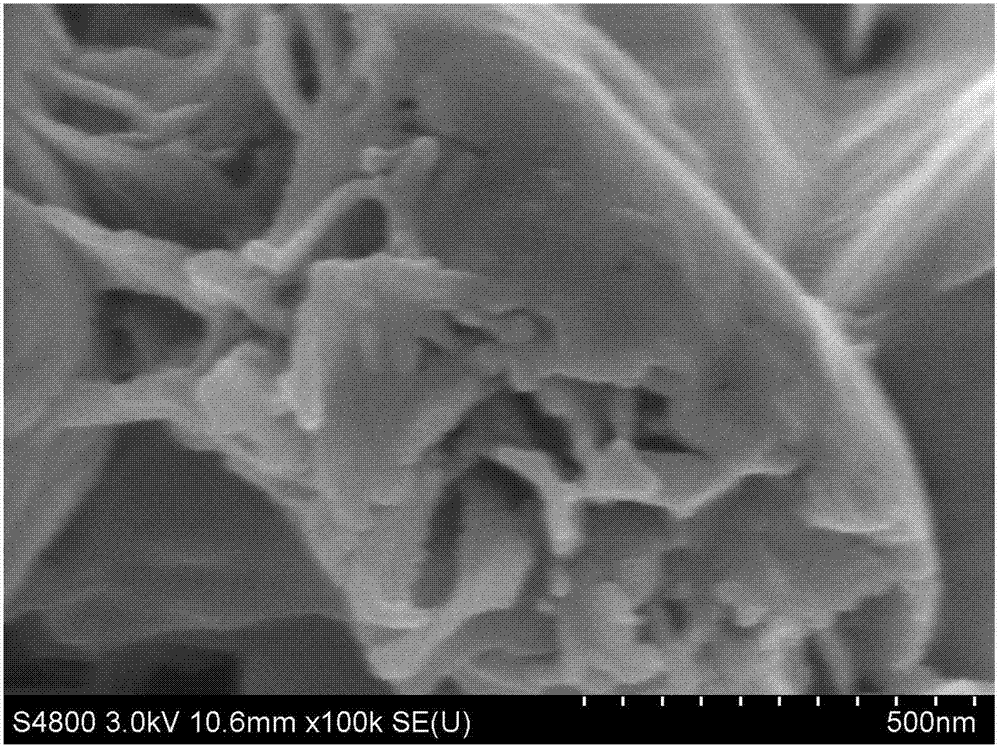CoO/reduced graphene oxide composite negative pole material and preparation method thereof
A negative electrode material, graphene technology, applied in the field of CoO/reduced graphene oxide composite negative electrode material and its preparation, to achieve high conductivity, improve electrochemical performance, and shorten the distance
- Summary
- Abstract
- Description
- Claims
- Application Information
AI Technical Summary
Problems solved by technology
Method used
Image
Examples
Embodiment 1
[0044] 1) Add 10mL of deionized water to 70mL of isopropanol, and configure it to 80mL of mixed solvent A;
[0045] 2) Add 0.5 mL of oleylamine and 0.5 mL of oleic acid to the mixed solvent A in a volume ratio of 1:1, and stir for 5 minutes to obtain a solution B;
[0046] 3) Take 1mmol of CoCl 2 ·6H 2 O, 10mmol of CO(NH 2 ) 2 , Add to solution B in sequence according to the molar ratio of 1:10, stir for 10 min to obtain solution C;
[0047] 4) Add 0.08 g of graphene oxide to solution C, and magnetically stir for 30 min to obtain suspension D;
[0048] 5) Ultrasonic treatment of suspension D for 8 hours;
[0049] 6) Put the ultrasonic suspension D in an oil bath, set the holding temperature to 90°C, and the holding time to 10h, and then naturally cool to room temperature to obtain precipitation E;
[0050] 7) Centrifuge the precipitate and wash it with absolute ethanol and hexane for 3 times, then put it in a vacuum drying oven at 70°C for 10 hours to obtain precursor F;
[0051] 8) Put t...
Embodiment 2
[0055] 1) Add 5 mL of deionized water to 75 mL of isopropanol, and configure it as 80 mL of mixed solvent A;
[0056] 2) Add 1 mL of oleylamine and 1 mL of oleic acid to the mixed solvent A in a volume ratio of 1:1, and stir for 5 minutes to obtain a solution B;
[0057] 3) Take 2mmol of CoCl 2 ·6H 2 O, 20mmol CO(NH 2 ) 2 , Add to solution B in sequence according to the molar ratio of 1:10, stir for 10min to obtain solution C;
[0058] 4) Add 0.12 g of graphene oxide to solution C, and magnetically stir for 40 minutes to obtain suspension D;
[0059] 5) Ultrasonic treatment of suspension D for 10 hours;
[0060] 6) Place the ultrasonic suspension D in an oil bath, set the holding temperature to 100°C, and the holding time to 8 hours, and then naturally cool to room temperature to obtain precipitation E;
[0061] 7) Centrifuge the precipitate and wash it with absolute ethanol and hexane for 4 times, then put it in a vacuum drying oven at 80°C and dry for 8 hours to obtain precursor F;
[0...
Embodiment 3
[0064] 1) Add 8 mL of deionized water to 72 mL of isopropanol and configure it to 80 mL of mixed solvent A;
[0065] 2) Add 1.5 mL of oleylamine and 1.5 mL of oleic acid to the mixed solvent A in a volume ratio of 1:1, and stir for 8 min to obtain solution B;
[0066] 3) Take 3mmol of CoCl 2 ·6H 2 O, 30mmol CO(NH 2 ) 2 , Add to solution B in sequence according to the molar ratio of 1:10, stir for 20 min to obtain solution C;
[0067] 4) Add 0.16 g of graphene oxide to solution C, and magnetically stir for 50 min to obtain suspension D;
[0068] 5) Ultrasonic treatment of suspension D for 12h;
[0069] 6) Put the ultrasonic suspension D in an oil bath, set the holding temperature to 110°C, and the holding time to 7h, and then naturally cool to room temperature to obtain precipitation E;
[0070] 7) Centrifuge the precipitate and wash it with absolute ethanol and hexane for 5 times, then put it in a vacuum drying oven at 90°C for 6 hours to obtain precursor F;
[0071] 8) Put the precursor ...
PUM
| Property | Measurement | Unit |
|---|---|---|
| Size | aaaaa | aaaaa |
| Size | aaaaa | aaaaa |
Abstract
Description
Claims
Application Information
 Login to View More
Login to View More - R&D
- Intellectual Property
- Life Sciences
- Materials
- Tech Scout
- Unparalleled Data Quality
- Higher Quality Content
- 60% Fewer Hallucinations
Browse by: Latest US Patents, China's latest patents, Technical Efficacy Thesaurus, Application Domain, Technology Topic, Popular Technical Reports.
© 2025 PatSnap. All rights reserved.Legal|Privacy policy|Modern Slavery Act Transparency Statement|Sitemap|About US| Contact US: help@patsnap.com



